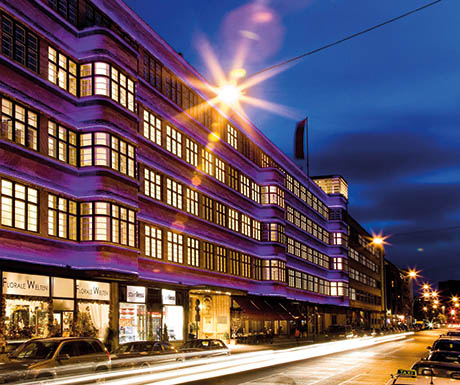By Rick Steves
When parents tell me they're going to Europe and ask me where to take their kids, I'm tempted to answer, "to Grandma and Grandpa's on your way to the airport."
It's easy to make the case against taking the kids along. A European vacation with kids in tow is much more about playgrounds and petting zoos than about museums and churches. And traveling with kids is expensive. Out of exhaustion and frustration, you may opt for pricey conveniences like taxis and the first restaurant you find with a kid-friendly menu. Two adults with kids spend twice as much to experience about half the magic of Europe per day than they might without.
But if you can afford it and don't mind accomplishing less as adult sightseers, traveling with your children can be great family fun, creating piles of lifelong memories. Moreover, it's great parenting, as it helps get kids comfortable with the wider world.
With kids, you'll live more like a European and less like a tourist. Your children become your ambassadors, opening doors to new experiences and relationships. Your child will be your ticket to countless conversations. Some of your best travel memories may be of your son floating a wooden boat alongside Parisian garçons in the great pond at Luxembourg Garden, or of your daughter kicking a soccer ball with kids at a park in Madrid. Let them race their new Italian friends around Siena's main square, the Campo, while you sip your Campari.
European families, like their American counterparts, enjoy traveling. You'll find kids' menus, hotel playrooms, and kids-go-crazy zones at freeway rest stops all over Europe. Traveling with an infant or toddler can be challenging, but parents with a babe-in-arms will generally be offered a seat on crowded buses and sometimes allowed to go to the front of the line at museums.
It helps to get your kids enthusiastic about what they'll be seeing in Europe. Before your trip, encourage your kids to learn about the countries, cities, sights, and people they'll be visiting. Even simple Wikipedia articles can provide enough background to pique a child's curiosity. Read books, fiction and non-fiction, set in the place you're going, such as The Diary of Anne Frank for Amsterdam or The Thief Lord for Venice. Watch movies together, such as The Sound of Music for Salzburg, The Red Balloon for Paris, or The Secret of Roan Inish for Ireland. Your hometown library can be a great resource for age-appropriate books and movies.
Get a jump on foreign phrases. Type out the top 20 or so and put them on the fridge for everyone to learn. Get a copy of the "10 Minutes a Day" book for your country's language — they come with preprinted sticky word labels that your kids will enjoy plastering onto your household items. Capitalize on whatever hobbies or games your children have that may relate to the history of the places you're visiting. Give your kids the chance to try out foreign specialties in advance by eating at ethnic restaurants, or get a cookbook and make meals together at home. Many US cities host celebrations of different cultures — look for festivals held by local communities of Greeks, Italians, Hungarians, or whatever group might be vibrant in your town or relevant to your family.
The key to a successful European family vacation is to slow down and to temper expectations. Don't overdo it. Tackle one or two key sights each day, mix in a healthy dose of pure fun, and take extended breaks when needed. If done right, you'll take home happy memories to share for a lifetime.
At What Age Can I Take the Kids?
My children are young adults now, but after taking them to Europe every year for their first 20 years, it's fun to think back about our European trips during different stages of their childhood. When they were grade-schoolers, our trips were consumed with basic survival issues, such as eating, sleeping, and occupying their attention. By the time they entered their teens, the big challenge became making our trips educational and fun.
Some parents won't take their kids abroad until they are old enough to truly enjoy the trip. My rule of thumb is that children should be able to stand a day of walking, be ready to eat what's in front of them, and be comfortable sleeping in strange beds. They should be able to carry their own daypacks with some clothes, a journal, and a couple of toys. I've found that a child is ready for an international trip at about the same age they're ready for a long day at Disneyland.
Grade-school kids are often the easiest travelers, provided you schedule some kid-friendly activities every day. They're happiest staying in rural places with swimming pools and grassy fields to run around in.
High-schoolers feel that summer break is a vacation they've earned. If this European trip is not their trip, you become the enemy. Make it their trip, too, by asking for their help — give each child who's old enough a location to research. Kids can quickly get excited about a vacation if they're involved in the planning stages. Consider your teen's suggestions and make real concessions. A day of shopping or at the beach might be more fun than another ruined abbey.
Prepping Your Kids
Before you leave home, get your kids enthusiastic about what they'll be seeing in Europe. Encourage them to learn about the countries, cities, sights, and people they'll be visiting. Look online for articles, photos, and video clips to pique their curiosity.
Read books, both fiction and nonfiction, set in the place you're going, such as The Diary of Anne Frank for Amsterdam or The Thief Lord for Venice. For younger kids, check out M. Sasek's delightfully illustrated This Is series on various European destinations (This is Venice, This is Edinburgh, and so on). Watch movies, such as The Sound of Music for Salzburg, The Red Balloon for Paris, or The Secret of Roan Inish for Ireland. Your hometown library can be a great resource for age-appropriate books and movies.
Get a jump on foreign phrases. Type out the top 20 or so and put them on the fridge for everyone to learn. Get the 10 Minutes a Day language book for your destination, which comes with preprinted sticky word labels that your kids will enjoy plastering around the house.
Try to relate your children's hobbies or favorite games to the place you're visiting (draw pictures of the Eiffel Tower, play dominoes saying the numbers in Italian). Give your kids the chance to try out foreign specialties in advance by eating at ethnic restaurants, or get a cookbook and make meals together at home. Many US cities host celebrations of different cultures — look for festivals held by local communities of Greeks, Italians, Hungarians, or whatever group might be vibrant in your town or relevant to your travels.
Precautionary Measures
Even if you have the most well-behaved kids in the world, things happen: Kids wander off, or they get separated from you in a crowd. Whenever you're traveling with children in an unfamiliar place, it's good to have a go-to procedure in place in case something happens. Be sure to give each child a business card from your hotel so they have local contact information.
When using public transportation, make sure everyone knows the final stop and have a backup plan for what to do if you lose each other (for example, plan to meet at your final stop or reconvene at your hotel).
In a crowded situation, having a unique family noise (a whistle or call, such as a "woo-woop" sound) enables you to easily get each other's attention. Consider buying walkie-talkies in Europe to help you relax when the kids roam (don't bring walkie-talkies from home, as ours use a different bandwidth and are illegal in Europe). If your kids don't have their own phones, you can purchase a cheap pay-as-you-go mobile phone in Europe; this can also be helpful in case of emergencies.
Europe is not the United States of Litigation. Europeans love children, but their sense of childproofing public spaces is vastly different from ours. You may find a footbridge across a raging river has child-sized gaps between the railings. Windows in fourth-floor hotel rooms may be easy to open and unscreened. The hot water may scald you in about 30 seconds. Pay attention.
Reflecting and Connecting
Help your kids collect and process their observations. Buy a journal at your first stop, and it becomes a fun souvenir in itself. Kids like cool books — pay for a nice one. The journal is important, and it should feel that way. Encourage kids to record more than just a trip log: Collect feelings, smells, tastes, reactions to cultural differences, and so on. Grade-school kids enjoy pasting in ticket stubs or drawing pictures of things they've seen.
It can be hard for kids to hang around grown-ups all day, so help your kids connect with other children. In hot climates, kids gravitate toward the squares (in cities and villages alike) when the temperature begins to cool in the late afternoon, often staying until late in the evening. Take your children to the European nightspots to observe — if not actually make — the scene (such as the rollerbladers at the Trocadéro in Paris or the crowd at Rome's Trevi Fountain).
Just a few phrases spoken by your kids will open many doors. Make a point of teaching them "thank you," "hello," and "good-bye" in the country's language. You'll find nearly everyone speaks English, but small phrases out of the mouths of babes will melt the cool of surly museum guards or harried shop clerks.
Older kids will want to keep in touch with friends at home and European pals they meet on their trip. If they're bringing their smartphones, smart use of Wi-Fi and apps such as Google Hangouts, FaceTime, or Skype makes staying connected easy and affordable. Otherwise, consider buying an international data plan so they don't run up huge roaming charges.
During the trip, your kids may complain about being parted from their friends or having to visit yet another museum. But don't lose heart — sometimes the payoff comes years down the road. Your child may surprise you one day by mentioning a painting in Madrid's Prado or recalling a fact about Rome's Colosseum. Besides building memories, your investment in a trip now is a down payment on developing a true citizen of the world.










